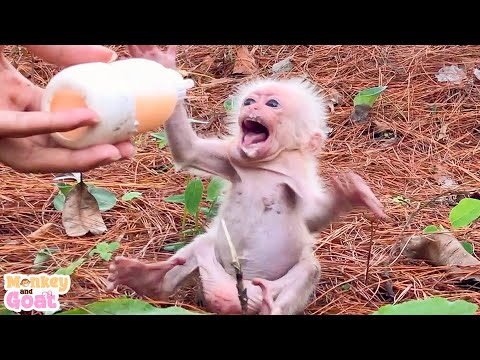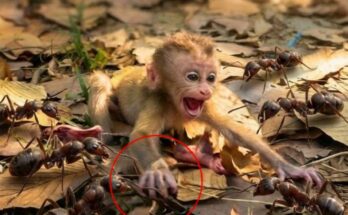
From the moment the sun rises and the canopy is bathed in golden light, this tiny primate is already seeking its favorite treat. While other young monkeys leap through branches, chase insects, or wrestle playfully, this one clings tightly to its mother’s side, eyes fixed on her belly where the warm milk awaits.
The mother, patient but clearly aware of her baby’s constant demands, tries to move about her day—grooming her fur, searching for tender leaves and fruits, or socializing with other members of the troop. Yet at every pause, the little one takes the opportunity to latch on, drinking greedily as if it hadn’t eaten for hours.
The forest around them is alive with activity. The calls of distant birds echo through the trees, and the rustle of leaves signals the movement of other monkeys above. Still, the baby is focused entirely on one thing: milk. It doesn’t matter if the troop is on the move, crossing thin branches high above the ground, or resting on a thick limb in the shade—the craving remains constant.
Sometimes, the mother gently pushes the baby away, encouraging it to explore and learn how to forage like the others. But the determined youngster quickly scrambles back, wrapping its tiny arms and legs around her body, pleading with soft squeaks. Other mothers in the troop occasionally glance over, as if amused by the persistence.
This behavior is more than just a sign of hunger—it’s a symbol of the deep bond between mother and child. Milk is not only nourishment; it’s comfort, warmth, and security. For a baby monkey in the wild, nursing is a moment of safety in an unpredictable world.
As days pass, the baby will gradually begin to taste solid foods—mango, banana, young leaves—and play more with its peers. But for now, its world revolves around one simple joy: that familiar, soothing taste of its mother’s milk.
In time, the baby’s dependence will fade, replaced by agility and independence. Yet these early days, filled with affectionate clinging and constant feeding, will forever be a tender chapter in its journey to adulthood.


